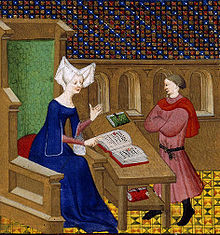User:Staranise/sandbox
""Women in the Middle Ages""
Childhood and Education
[edit]Marriage
[edit]Childbirth
[edit]Family Life
[edit]Inheritance and Property
[edit]Work and Trade
[edit]Art and Literature
[edit]
Christine de Pizan was a noted late medieval writer on women's issues. Her Book of the City of Ladies attacked misogyny, while her The Treasure of the City of Ladies articulated an ideal of feminine virtue for women from walks of life ranging from princess to peasant's wife.[1] Her advice to the princess includes a recommendation to use diplomatic skills to prevent war:
"If any neighbouring or foreign prince wishes for any reason to make war against her husband, or if her husband wishes to make war on someone else, the good lady will consider this thing carefully, bearing in mind the great evils and infinite cruelties, destruction, massacres and detriment to the country that result from war; the outcome is often terrible. She will ponder long and hard whether she can do something (always preserving the honour of her husband) to prevent this war."[2]
Science
[edit]Religious Life
[edit]The Roman Catholic Church was a major unifying, cultural influence of the Middle Ages with its selection from Latin learning, preservation of the art of writing, and a centralized administration through its network of bishops. Historically in the Catholic and other ancient churches, the role of bishop, like the priesthood, was restricted to men. The first Council of Orange (441) also forbade the ordination of deaconesses, a ruling that was repeated by the Council of Epaon (517) and second Council of Orléans (533).[3]
With the establishment of Christian monasticism, other roles within the Church became available to women. From the 5th century onward, Christian convents provided opportunities for some women to escape the path of marriage and child-rearing, acquire literacy and learning, and play a more active religious role.
Abbesses could become important figures in their own right, often ruling over monasteries of both men and women, and holding significant lands and power. Figures such as Hilda of Whitby (c. 614–680) became influential figures on a national and even international scale.
In the Late Middle Ages women such as Saint Catherine of Siena and Saint Teresa of Avila played significant roles in the development of theological ideas and discussion within the church, and were later declared Doctors of the Roman Catholic Church. The mystic Julian of Norwich was also significant in England.
Politics
[edit]Warfare
[edit]
References
[edit]- ^ Allen, Volume 2, The Early Humanist Reformation, Part 2, p. 646.
- ^ Christine de Pizan, tr. Sarah Lawson, The Treasure of the City of Ladies, or The Book of the Three Virtues, Penguin Classics, 2003, ISBN 0-14-044950-7, p. 22.
- ^ Herbert Thurston, "Deaconesses", Catholic Encyclopedia (1908)

